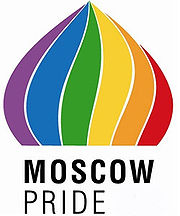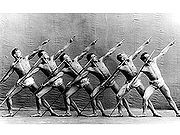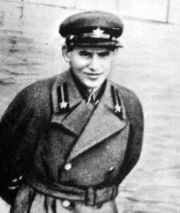
LGBT culture in Russia
Encyclopedia

Gay
Gay is a word that refers to a homosexual person, especially a homosexual male. For homosexual women the specific term is "lesbian"....
s and lesbian
Lesbian
Lesbian is a term most widely used in the English language to describe sexual and romantic desire between females. The word may be used as a noun, to refer to women who identify themselves or who are characterized by others as having the primary attribute of female homosexuality, or as an...
s than it did before the Revolutions of 1989
Revolutions of 1989
The Revolutions of 1989 were the revolutions which overthrew the communist regimes in various Central and Eastern European countries.The events began in Poland in 1989, and continued in Hungary, East Germany, Bulgaria, Czechoslovakia and...
, unofficial discrimination and fear are still rampant. "It would be foolish to interpret some new freedoms as tolerance," said Igor Kon, a sociologist who is Russia's best-known expert on sexual practices, and author of The Sexual Revolution in Russia. Gay life in Russia is less open than western countries,. With more quickly growing acceptance, major cities like Moscow and St Petersburg now have LGBT
LGBT
LGBT is an initialism that collectively refers to "lesbian, gay, bisexual, and transgender" people. In use since the 1990s, the term "LGBT" is an adaptation of the initialism "LGB", which itself started replacing the phrase "gay community" beginning in the mid-to-late 1980s, which many within the...
clubs and venues.
In 1989, 31 percent of the Russian population said in polls that homosexuals should be executed, and 32 percent said they should be isolated. Only 12 percent said they should be left alone. The figures are shifting slightly, however: in 1994, 23 percent in a poll said homosexuals should be killed, 24 percent said they should be isolated, and 29 percent said they should be left alone.
"What everyone here knows -- gay or straight -- is how to have a private life that is different from their public life," said David Tuller, an American journalist and author of Cracks in the Iron Closet: Travels in Gay and Lesbian Russia. "In the West we would call that living a lie," he said. "Here they don't think that way. This is not a talk-show culture. Nobody is ever going to appear on television to talk about wanting to sleep with short men or tall women. They just want to be able to have their lives and not be bothered. For people here that would be a big step."
History of gay Russia

In 1832, the criminal code that included Article 995, which stated that "muzhelozhstvo" or men lying with men a criminal act punishable by exile to Siberia for up to 5 years. Men lying with men was interpreted by courts as meaning anal sex. Application of the laws was rare, and the turn of the century found a relaxation of these laws and a general growing of tolerance and visibility.
Under Stalin, the Soviet Union
Soviet Union
The Soviet Union , officially the Union of Soviet Socialist Republics , was a constitutionally socialist state that existed in Eurasia between 1922 and 1991....
recriminalized homosexuality in a decree signed in late 1933. The new Article 121, which punished muzhelozhstvo with imprisonment for up to 5 years saw raids and arrests.

Mikhail Gorbachev
Mikhail Sergeyevich Gorbachev is a former Soviet statesman, having served as General Secretary of the Communist Party of the Soviet Union from 1985 until 1991, and as the last head of state of the USSR, having served from 1988 until its dissolution in 1991...
's administration, the first gay organization came into being. The Moscow Gay & Lesbian Alliance was headed by Yevgeniya Debryanskaya, and Roman Kalinin who became the editor of the first officially registered gay newspaper, Tema. The fall of the USSR accelerated the progress of the gay movement in Russia. Gay publications and plays appeared. In 1993, a new Russian Criminal Code was signed, without Article 121. Men who had been imprisoned began to be released.
Modern gay life in Russia is in the process of increasing openness. The first gay oriented businesses appeared including bars, discos, saunas, even a travel agency. Life for gays and lesbians in the provinces remains difficult, but there are gay communities and open gay culture in large cities such as Moscow
Moscow
Moscow is the capital, the most populous city, and the most populous federal subject of Russia. The city is a major political, economic, cultural, scientific, religious, financial, educational, and transportation centre of Russia and the continent...
and St Petersburg. At a press conference on 1 February 2007, Russian President Vladimir Putin
Vladimir Putin
Vladimir Vladimirovich Putin served as the second President of the Russian Federation and is the current Prime Minister of Russia, as well as chairman of United Russia and Chairman of the Council of Ministers of the Union of Russia and Belarus. He became acting President on 31 December 1999, when...
was asked for his opinion in the midst of a row over the decision by Moscow Mayor Yury Luzhkov to ban a Gay pride
Gay pride
LGBT pride or gay pride is the concept that lesbian, gay, bisexual, and transgender people should be proud of their sexual orientation and gender identity...
in Moscow, called Moscow Pride
Moscow Pride
Moscow Pride is a demonstration of lesbians, gays, bisexuals and transgendered persons . It was intended to take place in May annually since 2006 in the Russian capital Moscow, but has been regularly banned by Moscow City Hall, headed by Mayor Yuri Luzhkov until 2010...
. Vladimir Putin
Vladimir Putin
Vladimir Vladimirovich Putin served as the second President of the Russian Federation and is the current Prime Minister of Russia, as well as chairman of United Russia and Chairman of the Council of Ministers of the Union of Russia and Belarus. He became acting President on 31 December 1999, when...
said: "With regards to what the heads of regions say, I normally try not to comment. I don’t think it is my business. My relation to gay parades and sexual minorities in general is simple – it is connected with my official duties and the fact that one of the country’s main problems is demographic. But I respect and will continue to respect personal freedom in all its forms, in all its manifestations."
Documentaries
Several documentaries about gay life in Russia surfaced in the 1990s after the fall of the USSR including Kiev Blue, To My Women Friends, and Moscow Fags.Moscow Pride '06
Moscow Pride '06
Moscow Pride '06 is a documentary movie of the 2006 Gay pride parade in Moscow.-Synopsis:The documentary features the events that took place around the first Moscow Pride festival in Russia’s capital from May 25 to May 27 2006....
, is a documentary about the first Moscow International LGBT Pride Festival. The premiere was held on November 27, just six months after the festival. Some focuses of the documentary include the Nordic festival, the Russian gay cultural contest, Merlin Holland
Merlin Holland
Christopher Merlin Vyvyan Holland is a biographer and editor. He is the son of the author Vyvyan Holland and his second wife, the former Thelma Besant, and is the only grandchild of Oscar Wilde...
’s lecture on his grandfather Oscar Wilde
Oscar Wilde
Oscar Fingal O'Flahertie Wills Wilde was an Irish writer and poet. After writing in different forms throughout the 1880s, he became one of London's most popular playwrights in the early 1890s...
and the International Day Against Homophobia
International Day Against Homophobia
The International Day Against Homophobia and Transphobia is celebrated every May 17.It is coordinated by the Paris based "IDAHO Committee" founded and presided by French academics, Louis-Georges Tin...
(IDAHO) Conference . Moscow Pride '06
Moscow Pride '06
Moscow Pride '06 is a documentary movie of the 2006 Gay pride parade in Moscow.-Synopsis:The documentary features the events that took place around the first Moscow Pride festival in Russia’s capital from May 25 to May 27 2006....
also focuses on the trouble around The Kremlin
Kremlin
A kremlin , same root as in kremen is a major fortified central complex found in historic Russian cities. This word is often used to refer to the best-known one, the Moscow Kremlin, or metonymically to the government that is based there...
and Moscow City Hall
Moscow City Hall
The former Moscow City Hall is an ornate red-brick edifice situated immediately to the east of the State Historical Museum and notable in the history of architecture as a unique hybrid of the Russian Revival and Neo-Renaissance styles. During Soviet times it served as the V. I...
when participants gathered to protest the ban on the Moscow Pride
Moscow Pride
Moscow Pride is a demonstration of lesbians, gays, bisexuals and transgendered persons . It was intended to take place in May annually since 2006 in the Russian capital Moscow, but has been regularly banned by Moscow City Hall, headed by Mayor Yuri Luzhkov until 2010...
march – and the Tverskoy Court decision to uphold Mayor Yuri Luzhkov's decision to ban the march. Vlad Ortanov, former editor of Argo, one of the oldest gay magazines in Russia, described the documentary as “a great human historical document that will say a lot to the future generations”.
LGBT media
There are modern gay journals such as KvirKvir
Kvir is a Russian gay lifestyle magazine. It was launched by www.gay.ru which runs the GLBT Center "Together", a non-profit organization.The glossy color magazine was first published in 2003 and is still running....
along with older ones such as now defunct Tema, the first registered gay magazine.
LGBT magazines and newspapers
- KvirKvirKvir is a Russian gay lifestyle magazine. It was launched by www.gay.ru which runs the GLBT Center "Together", a non-profit organization.The glossy color magazine was first published in 2003 and is still running....
(M) Gay lifestyle magazine. 2003- - BF BEST FOR (M) Gay lifestyle magazine. 2005-
- Ty (M) ed. Gennady Krimenskoi, 2 issues: 1992, 1993
- Argo (M) ed. Vlad Ortanov & Konstantin Evgen'ev 1994-present, 3 issues, 4th coming soon (1996)
- Tema (M) ed. Roman Kalinin (& Vitaly Lazarenko) 1990-93, 13 issues
- 1/10 (M) ed. Dmitry Lychev, 1991-present
- (also No. 1 / 94: 1/10 International in English
- and SOHO Revue 8 /94 Russian insert in Czech gay magazine)
- Kristofer (SPb) ed. G. Vetskoi & Sergei Shcherbakov, 1992
- Impul's (M) ed. Grigorii Vetskoi, Nikolai Sivolobov, 1992
- Risk (M) ed. Vlad Ortanov & Dima Kuzmin, 1990-1993, 5-6 issues
LGBT Journals of literature and culture
- Gay, Slaviane! (SPb) ed. Olga Zhuk, Sergei Shcherbakov, Gennady Trifonov, 2 issues: 1993, 1994
- Risk (M) ed. Dmitry Kuzmin (Egor Gorodetskii, Yaroslav Mogutin), 2 issues: 1995, 1996
See also
- Moscow PrideMoscow PrideMoscow Pride is a demonstration of lesbians, gays, bisexuals and transgendered persons . It was intended to take place in May annually since 2006 in the Russian capital Moscow, but has been regularly banned by Moscow City Hall, headed by Mayor Yuri Luzhkov until 2010...
Gay pride in Moscow - Moscow Pride '06Moscow Pride '06Moscow Pride '06 is a documentary movie of the 2006 Gay pride parade in Moscow.-Synopsis:The documentary features the events that took place around the first Moscow Pride festival in Russia’s capital from May 25 to May 27 2006....
the movie - LGBT rights in Russia

